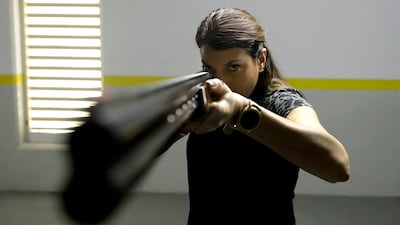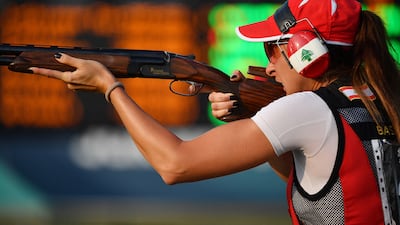As part of our build-up to the Tokyo Olympics we will be profiling Arab athletes and para-athletes as well as those from the Mena region hoping to make it to this summer's Games
When Lebanon entered another lockdown at the start of this year to curb the spread of Covid-19, two-time Olympian and Asian champion shooter Ray Bassil found she had no alternative but to head back to the underground garage of her apartment building to train in a confined space between parked cars.
The 32-year-old Trap shooter is preparing for a third consecutive appearance at the Olympic Games and over the past year has spent a significant amount of time in her garage at home near Jounieh, improvising a training plan with her cousin and temporary coach Nahi, in order to stay in shape ahead of Tokyo.
Unable to fire any bullets and with no real targets to aim for, Bassil worked on her reflexes and her balance, and did what she refers to as “dry shooting” while she waited for facilities to reopen in Lebanon.
"I needed to find a way. I needed to at least get myself up to 50 per cent ready for the season," Bassil told The National.
“To start over again is so hard – imagine heading straight to competition without any preparation. So that kept me in the mood at least.”
Videos and photos of Bassil’s makeshift training set-up circulated on social media and caught the attention of officials in Lebanon – which was her plan all along.
“I posted the video just to tell the world and to tell the people – regardless of what is happening with the pandemic – that first of all there is always a way to train, and second of all it was a message to the Ministry of Sport and the government that they should take notice of what we’re putting ourselves through, maybe there are some exceptions you can make for us athletes. It’s unbelievable that we’re training in garages and you haven’t given us any sort of exception,” explained Bassil.
“That caused quite the stir in Lebanon and it led the government to give some exemptions to athletes.
“It was my voice on behalf of all the athletes in Lebanon who have Olympic qualifications coming up so they could train and prepare for their competitions.”
As the only Lebanese athlete officially qualified for the Tokyo Olympics so far – thanks to her gold-medal showing at the Asian Championships in 2019 – Bassil is hoping some of her compatriots will be able to join her this summer in Japan, and she’s doing everything she can to make sure they gain access to decent training conditions.
Blazing a trail
Taking on a leadership role is nothing new for Bassil. When she first took up Trap shooting as a teenager, she was practically the only Arab female on the scene. She was introduced to the sport by her father and fell in love with it immediately, giving up on her other two passions - basketball and swimming - in favour of spending time at the shooting range.
Six months into her training, she competed at the World Championships in Cairo, where she was the youngest competitor (16). Her father helped establish an Arab federation for shooting and together they encouraged more girls from the region to take up a sport traditionally dominated by men.
“About five years after I started, we started seeing national women’s teams representing Qatar and Kuwait and so on,” Bassil recalls. “So it took a bit of time but to be part of this development of the sport in the Arab world is something really interesting.”
In Lebanon, there are still barely any women at the competitive level in shooting and Bassil is keen to change that through her academy, which she launched last year and plans on reopening after the Olympics. She believes in her role of promoting sport back home, which is why she felt the need to stick up for her fellow athletes during these difficult times.
“I’ve always cared about Lebanese athletes, I always care to really have a good sports environment; I support women in sport, Lebanese in sport, Arabs in sport. I like to give always motivation,” said Bassil.
“At the end of the day an athlete has responsibilities towards their community and the responsibility comes in the way you deliver the message, and conveying an accurate image of your circumstances and the circumstances of the whole country. For me, athletes are messengers.”
Admiring Serena
When asked who she draws inspiration from, Bassil said she looks to tennis legend Serena Williams, drawing parallels with the American and her father's influence on her career.
“I follow what she says, all her interviews, because I feel she’s a very strong woman inside out, she inspires me a lot,” she said. “Her life, her journey, how she started with her dad, it’s the same story as mine, so it’s really impressive. It would be a dream to meet her in person and to watch her playing live.”
Bassil's first Olympics was London 2012, where she remembers feeling “like a little boy in a playground”. She soaked up the experience in every possible way, roaming around, mingling with other athletes and turning the tradition of pin-swapping into an Olympic sport.
“They were all laughing at me because I was running around from one country to another, gathering pins. I ended up collecting about 180 pins,” Bassil said.
“For me it was like, ‘Wow, there’s Maria Sharapova, there are the basketball players’ … I was taking lots of photos and I was so taken by these things, that, ‘wow, I’m at the Olympics’; it left a big trace and for me I felt like I want to be in the next Olympics, but I want to be really in the Olympics and compete properly, not like I was in London.”
Edging closer
In 2016, Bassil travelled to Rio de Janeiro ranked No 1 in the world in Trap shooting and brimming with confidence. She fell just short of making the final, which only amplified her desire to set the record straight in Tokyo.
“Now I’m taking a different path, a different kind of training. Definitely I’m more mature in my preparation, the environment I’ve placed myself in always, not to over-think about it like I used to. So there are many things I’m really trying to work on,” she explains.
“I feel like I’m doing what I’m really supposed to do, I’m doing things in the right way, the right direction.”
The postponement of last year's Olympics due to the pandemic affected athletes in different ways. For Bassil, after the initial emotional rollercoaster that came with waiting for a decision to be made regarding the postponement, she took a relaxed approach towards the new schedule and used the additional year of preparation wisely.
“It created time for me to sit with myself and make future plans, focus on myself, try to find other alternatives, try to challenge myself … so many things came up,” she said.
Bassil returned to competition in February, and has recorded positive results since, placing fourth at a World Cup in Cairo, and finishing second at an event in Bulgaria. She is currently in Italy training and has her eyes firmly set on the podium in Tokyo.
Doing it for her people
Lebanon has had an exceptionally tough year, not just because of the pandemic, but with the harrowing explosion that rocked Beirut as well as the financial crisis that followed.
“Psychologically we are exhausted,” Bassil admits.
“And me, being far, to take a decision to disconnect from where I am to come over to a place where all you do is train, mentally it’s hard, even though this is how it should be. It’s not easy.
“I hope God gives me the strength and the patience that I can pass all this period without any depression. I really want to be strong enough to do this for Lebanon, for my people. Hopefully God will be by my side because this past year was not easy, on all levels.”
Bassil is hoping to claim Lebanon’s first Olympic medal since 1980, and if she succeeds, she’d be the first woman from her country to make the podium at the Games.
Does she feel pressure?
“In the past I used to feel the pressure. Now I learned not to see it as pressure. I just think of myself and the people who stood by my side and I don’t worry about anything else,” she says.
“I’m doing this for the people of Lebanon and they will never blame me for anything because they understand I’m not getting the necessary support. I’m doing it for myself, my family and my people. So definitely I’m not feeling pressure. The fact of being there is already something for me.
“At least we have one athlete from Lebanon at the Olympics. So that’s already something.”







